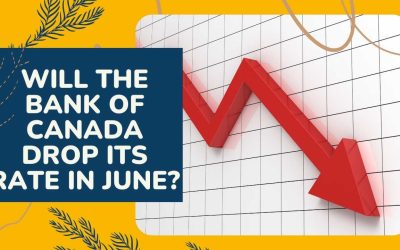Since the inflation data released last week, Government of Canada bond yields have surged to a 16-year high, setting the stage for an increase in fixed mortgage rates. This surge in bond yields has implications for borrowers seeking stability through fixed-rate mortgages, potentially looking at an increase in rates of up to 0.30%. At the time of this writing, a 5.49% 5-year rixed rate is available, but we have already seen some lenders increase their rates to about 5.80%.
If bond yields continue to rise, further increases in mortgage rates may be on the horizon. As a result, rates within the 5% range could soon become a rarity, barring special rate offers.
In the current market landscape, most mortgage rates have already surpassed the 6% mark. The average nationally available deep-discount rate for high-ratio 5-year fixed mortgages stands at 5.79%, while uninsured rates, applicable to those with a down payment of 20% or more, hover around an average rate of 6.34%.
The rise in yields to levels last witnessed in 2007 can be attributed to a higher-than-expected inflation reading in Canada this week and comments from the U.S. Federal Reserve, hinting at a potential prolonged period of elevated interest rates.
Anticipating Rate Cuts: The Larger Concern
While market projections currently indicate slight odds of two more rate hikes by the end of the year, many experts believe that the central bank has exhausted most of its upward rate adjustment potential, with just one more quarter-point hike remaining in its arsenal. However, the pressing question is not about further hikes, but rather the timing of the Bank’s anticipated rate cuts.
Market sentiment is now leaning towards expecting the Bank’s first rate cuts in the latter half of 2024. The historically observed gap of roughly 10 months between the Bank of Canada’s last rate hike and its first rate cut is a critical factor in this analysis. However, it’s acknowledged that this gap can vary significantly between different rate-hike cycles.
The question at hand is how long the Bank of Canada will maintain a tight monetary stance. The impact of these decisions will be felt by both variable-rate borrowers and individuals securing or renewing mortgages at the elevated rates, potentially influencing their financial strategies.
Consequences of Higher Interest Costs
As expectations grow for an extended period of higher interest rates, the implications extend to both variable-rate borrowers and those entering the housing market or renewing existing mortgages at the prevailing elevated rates. A survey conducted by Mortgage Professionals Canada revealed that 65% of mortgage holders anticipate renewing their mortgage in the next three years, and over two-thirds express concern about renewing at potentially higher mortgage rates.
The cumulative effect of rate hikes is already evident in rising debt-servicing costs. Monthly mortgage payments for the typical home purchase have surged to $3,600, marking a 21% increase from a year ago and an astounding 80% rise over the past two years, according to Ben Rabidoux of Edge Realty Analytics. Furthermore, the interest-only debt-service ratio climbed to 9.9% in the second quarter, reaching its highest level since 2007, as outlined in a report by Oxford Economics.
The report noted, “Our modeling shows that household interest payments as a share of disposable income will rise to 10.3% in the coming months.” It also predicts that highly indebted households may reduce spending as they work to deleverage and pay down debt, which is expected to lead to a downward trajectory in the principal portion of the debt-service ratio.
In conclusion, the recent surge in bond rates in Canada to a 16-year high is poised to have a far-reaching impact on the mortgage market, potentially altering the landscape for fixed-rate mortgages. Borrowers and market participants will need to closely monitor these developments and adjust their financial strategies accordingly in this evolving interest rate environment.






0 Comments
Trackbacks/Pingbacks